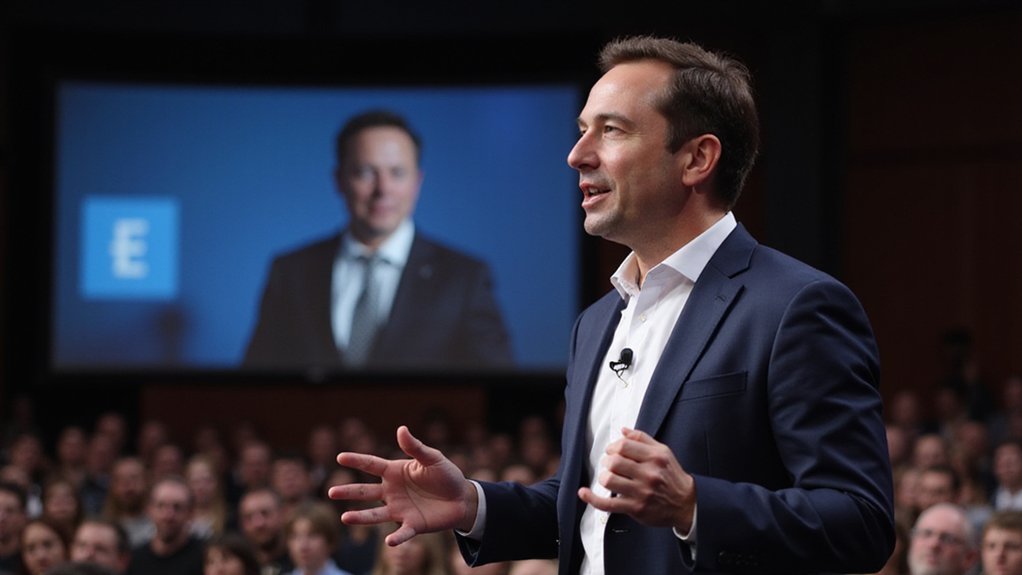Howard Winklevoss, father of the Winklevoss twins, played a vital role in Gemini’s development as a regulated cryptocurrency exchange. While not the operational founder (his sons Cameron and Tyler established Gemini in 2014), his influence shaped the platform’s regulatory-first approach. Under the family’s guidance, Gemini evolved from basic Bitcoin trading into an extensive exchange featuring 160+ cryptocurrencies with institutional-grade security measures. This regulatory blueprint—somewhat alien in crypto’s Wild West era—established a bridge between traditional finance and digital assets.

The curious intersection of traditional finance and cryptocurrency innovation finds perhaps no better embodiment than in Howard Winklevoss‘s connection to Gemini, the regulated digital asset exchange founded in 2014.
Operating under the watchful eye of the New York State Department of Financial Services (NYSDFS), Gemini emerged as a beacon of regulatory compliance in an industry often criticized for its Wild West approach to financial oversight.
What began as a modest platform focused primarily on Bitcoin and Ethereum has evolved into a extensive exchange supporting over 160 cryptocurrencies across more than 300 trading pairs.
Winklevoss’s vision for Gemini centered on institutional-grade security—a non-negotiable foundation upon which all other services would be built.
This commitment materialized through sophisticated cold storage solutions, multi-signature wallets, and insured custody services that, remarkably, have helped the exchange avoid the catastrophic security breaches that have plagued so many of its competitors. The exchange prioritizes security with ISO/IEC 27001:2013 certification for its Information Security Management System.
The platform’s trading infrastructure reflects a similar dedication to excellence, offering both novice-friendly interfaces and the more sophisticated Gemini ActiveTrader for those who prefer advanced charting capabilities and technical analysis tools.
As cryptocurrency markets matured, Gemini expanded into staking services—allowing users to participate in blockchain networks while earning rewards—with particular emphasis on Polygon, Ether, and Solana (though the latter remains unavailable to U.S. users).
This evolution represents the exchange’s adaptability to emerging cryptocurrency paradigms while maintaining its regulatory scruples.
The absence of minimum balance requirements for staking participation suggests a democratizing ethos that stands somewhat at odds with traditional finance’s exclusionary tendencies.
Gemini’s dual-interface approach—offering both robust web and mobile platforms—acknowledges the modern trader’s need for constant market access. The platform features an attractive interface that integrates all necessary tools for market understanding and investment into a single streamlined trading view.
While its integration with specialized accounting software addresses the often overlooked tax implications of cryptocurrency transactions.
Like other centralized exchanges that serve as intermediaries in the cryptocurrency marketplace, Gemini requires comprehensive identity verification procedures to comply with financial regulations.
Perhaps most telling of Winklevoss’s philosophy is Gemini’s investment in educational resources, tacitly acknowledging that cryptocurrency’s mainstream adoption depends not just on technological infrastructure but on cultivating a financially literate user base capable of handling this complex digital asset landscape.
Frequently Asked Questions
What Was Howard Winklevoss’s Role Before Entering the Cryptocurrency Space?
Prior to his cryptocurrency ventures, Howard Winklevoss built a distinguished career spanning academia and entrepreneurship.
After teaching actuarial science at Wharton and authoring the influential “Pension Mathematics with Numerical Illustrations,” he founded Winklevoss Consultants, providing financial services to over 125 major corporations.
His entrepreneurial acumen culminated in Winklevoss Technologies, which developed specialized actuarial software for defined benefit pension plans—a venture eventually acquired for $125 million in 2023.
How Did Howard Mentor His Sons in Business Ventures?
Howard Winklevoss mentored his sons by leveraging his entrepreneurial background and asset management experience to instill business acumen.
He imparted regulatory understanding—critical for Gemini’s compliance-focused approach—while encouraging their early cryptocurrency adoption.
Howard’s blend of financial discipline and willingness to embrace innovative technologies clearly influenced the twins’ business strategies.
His guidance extended beyond theoretical advice to practical support, helping his sons navigate the intersection of traditional finance and emerging digital assets.
What Personal Investment Strategies Does Howard Winklevoss Recommend?
Howard Winklevoss advocates for investment strategies grounded in Austrian economic principles, emphasizing sound money fundamentals over market speculation.
He recommends diversification across carefully selected crypto submarkets after thorough risk evaluation.
His approach prioritizes assets with fixed supply characteristics independent of governmental control—notably Bitcoin.
Rather than chasing trends, he suggests focusing on underlying fundamentals: product viability, team quality, and token economics.
This actuarially-informed methodology blends traditional financial analysis with conviction in decentralized digital assets as vehicles for long-term value preservation.
How Does Howard Winklevoss View Cryptocurrency Regulation?
Howard Winklevoss champions a nuanced regulatory approach that balances oversight with innovation.
He advocates industry-led self-regulation through initiatives like the Virtual Commodity Association, believing blockchain’s inherent transparency can facilitate better compliance mechanisms than traditional models.
Rather than waiting for regulators to dictate terms (often with limited technical understanding), he promotes collaborative frameworks where exchanges establish uniform standards for AML/KYC protocols and market surveillance—preserving the technology’s disruptive potential while offering necessary investor protections.
What Philanthropic Causes Does Howard Winklevoss Support?
Howard Winklevoss prominently supports educational philanthropy, evidenced by his $4 million Bitcoin donation to Grove City College—the institution’s first-ever cryptocurrency gift—which established the Winklevoss School of Business. This contribution reflects his commitment to advancing economic education, particularly programs aligned with Austrian school principles and sound money concepts. His philanthropic focus appears strategically directed toward institutions that champion free enterprise and financial independence, consistent with his own intellectual foundations under economist Hans Sennholz.









